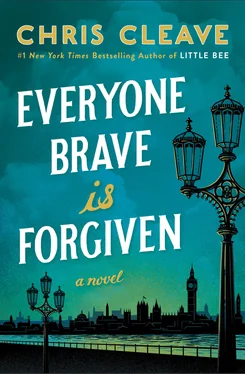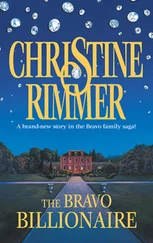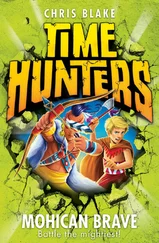“What’s too much?’
“Writing. Math. All of them staring at me in class. My head goes I can’t do this, I can’t be here, louder and louder till I run. I want to stay but I can’t.”
Tom turned up his collar and lit a cigarette from the end of the last.
“Well?’ said Zachary.
“Well, what? I’ve no idea what’s wrong with you.”
Zachary hesitated. “But you think there’s something?”
“Miss North thinks you have word blindness. She hasn’t reached a diagnosis for me.”
“Why, what is it with you?”
Tom shrugged. “With a name it might be excusable.”
The wind got up, whipping snow at their faces.
“How long do you want to stay out here?” said Tom at last.
Zachary dug his hands in his pockets and said nothing.
“It’s harder to go back, isn’t it?” said Tom. “Why don’t you let me drag you?”
Zachary showed no expression. “Go in if you’re cold. I’ll follow if I like.”
Tom weighed it for a moment, then said, “Fine,” and went in. Halfway down the corridor, in case the boy was following, he said over his shoulder: “The newborn’s name is Jesus, by the way. In case the shepherds ask again.”
A pause, a scuffing of shoes behind him. Then, “I’m not retarded.”
Tom grinned.
In the classroom Betty Oates was saying, “An angel told the shepherds to come from the fields and look, and the shepherds came and they were amazed.”
George and Poppy had been giggling together, and now their laughter became hysterical. Mary frowned over the top of the piano. “When your parents are here tomorrow for the real thing, neither I nor the angels shall expect to hear any silliness, is that understood? Now carry on, please.”
The children sang “Silent Night.” They changed back into their uniforms and tidied the manger. They hung halos up on pegs and went home early, to be well ahead of the evening’s raid when it came.
Mary sat down with Tom in the back of the empty classroom.
“You did well to bring him back.”
“Oh, I didn’t do anything. You were right about the boy. He’s okay.”
She stroked his cheek. “You’re okay.”
“Ah, but you’re something else.”
“That’s what my father says, although I am not sure he means it as kindly as you do. Walk me home?”
“I’m not sure…”
“Oh, you mustn’t mind my father. He’s almost never at home, and if he is then he’ll make you drink a glass of his Christmas wine, that’s all. Palmer makes it from cloves and church bells and Dickens. Practise your face for me.”
Tom licked his lips. “That is superb.”
Mary looked worried. “Too much.”
Tom tried again. “What an interesting flavor.”
She nodded approval. “You oughtn’t to overdo it, or Father will make you drink a second glass. It has happened before.”
“Did the victim survive?”
“The dog found the vat one year. We buried him under the japonica.”
They went outside. The snow fell in graceless clumps. It turned to a greasy slush on the pavement, and soon they were both cold and wet.
“Isn’t it good?” Mary said. “If this holds up there won’t be a raid tonight.”
Tom eyed the sky. “I really hate them, you know. I never thought I had it in me. But they really are the most hateful bastards.”
“That’s why we call them the enemy. See how it works now, darling?”
He smiled. “I don’t know what I should do without you.”
“You’d live your life in terrible confusion,” she said gaily, taking his arm.
He slowed to a stop under the scant shelter of a grocer’s awning. The shopwindow was crosshatched with tape, and behind it the bacon slicer and the cheese wire and the black iron scales stood on the empty shelves, the vocabulary of a language with no remaining speakers.
“Tom? Darling?”
He realized he was still staring into the hungry shop.
“I think you should leave me,” he said.
The wind whipped wet snow at their legs. Engines raced as motorcars’ tires spun in the slush.
Mary said, “Shall we go somewhere warm?”
They found a café, two tables wide, with empty sugar shakers and a bare Jacob’s-biscuit display case on the counter. They were the only customers. They took off their gloves but kept their coats and hats on.
“I don’t suppose you’ve anything to eat?” said Mary to the waitress.
“There’s only tea.”
“Splendid,” said Mary. “Let’s have some, shall we?”
It came in a brown glazed teapot. Looking into it as it was stirred, one could cultivate the hope that the tea was strong. One hoped, as one had hoped all through these gradually diluted months, until one poured it out over the quarter inch of thin white milk and saw that it was practically clear. The leaves were used to exhaustion.
Tom rattled a teaspoon around his cup. “I tried to join the Air Force.”
She put her hand on his. “No…”
“I thought I might have it in me to shoot at the Germans’ bloody airplanes, now that it’s self-defense. But the War Office won’t let me.”
“Oh Tom…”
“I thought you might be proud of me in uniform.”
She took his face and angled it up to look at her. “Do you really think so little of me?”
“You are a sweet, loyal girl. But we both know it isn’t how it was.”
“Of course it isn’t, you silly man. We are a thousand years older.”
“I sometimes imagine what it would be like for you if you were with a man like Alistair. Someone fighting the real war.”
They stirred the pale tea. The wet snow blinded the window.
“I don’t imagine it,” she said.
‘But you’ve thought about it.’
He waited. Her teaspoon clinked against the cup.
“I don’t suppose I was meant to love a man like that, his heart made so heavy by war.”
“But he has had to become like that.”
“Well, we don’t have to.”
“Don’t we, though? I feel worse every day I stay behind. One knows one won’t be killed, but that’s hardly the same as living.”
“Please…”
He held his head in his hands. “I’m no use, you see.”
“Don’t,” said Mary. “We’ll get you back on your feet. A glass of my father’s Christmas wine will do the trick. It’s so ghastly, I promise it will make you forget these blues and pray for simple death.”
It made it all the more awful that she was so indestructible. “Please,” he said. “You’d be so much happier without me.”
“But it wouldn’t be my life, don’t you see? You’re the one I’ve chosen, and I love you even more for being good enough to ask me not to choose you.”
A ghost of a smile rose in him. “You are quite mad, I think.”
“Mother just calls me stubborn.”
Tom felt utterly spent, as weak as the tea. It was terrifying, how close one came to cracking up. “God, I’m sorry.”
She shook her head. “We must take turns, don’t you think? Every time one of us is buried like this, we shall dig the other out.”
They sat for a few minutes in the empty café, finishing the tea while there was still warmth in it. Another couple came in and stamped the slush off their shoes, she in a long hooded cape and he in the uniform of a naval officer. The waitress served them biscuits from under the counter.
Mary laughed and took Tom’s hand. “Come on, let’s get out of here.”
Out in the snow they drew their coats tight at the throat and walked hand in hand. Although the winter storm was bitter there was comfort in it, since it meant there would be no raid that night. Later they would sleep together — this was understood — and if there was less heat in it than there had been at the start, then perhaps there might be more warmth.
Читать дальше












